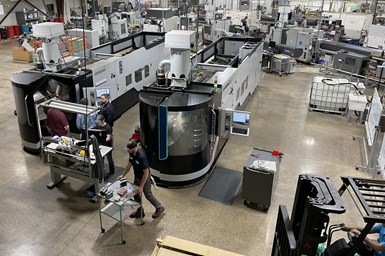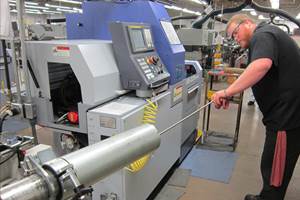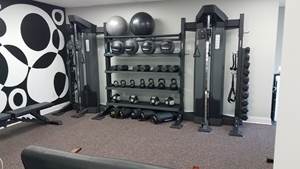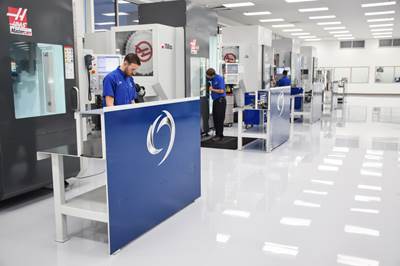Attracting Shopfloor Talent: Four Questions to Ask Yourself
Here is food for thought to perhaps better pique the interest of young job seekers in joining your manufacturing company.

Machine shops and manufacturers must do all they can to make their companies as enticing to young people as possible.
When October rolls around, the personal side of me appreciates cooler weather, football and Halloween. The professional side of me calls to mind Manufacturing Day, held every first Friday of that month.
I know many of you open your doors that day (and some of you do so multiple days throughout the year) to young people, their parents, school faculty and community leaders so they can see the opportunities a manufacturing business such as yours offers — not just in terms of a job, but of a successful, rewarding career.
But, even beyond that, there are other ways that can potentially help make your company more enticing to those in high school and college who will soon be entering our country’s workforce. Here are a few I’ve learned about from shops in the form of questions I’d suggest that you’d ask yourself.
Are your job descriptions antiquated? When Justin Quinn became owner and president of Focused On Machining, a job shop located near Denver, Colorado, he initially used what he says is a traditional job description for a machining business. That is, one asking about specific machine shop experience and talents, and also describing common daily tasks using words such as “operating a mill” or “using hand gages to measure parts.” However, he soon realized that for his shop to succeed and grow, he had to make the good opportunities there more enticing for young people.
Therefore, he and a sharp young employee worked to create a new job description they hoped would garner more attention. The job descriptions they developed did not ask about a person’s shop experience or credentials. Instead, they described duties such as working with one’s hands, crafting new products, using CAD software and so on. The job descriptions also highlighted attractive benefits beyond vacation pay and a health care plan, including a four-day work week, flexible schedules and a fun environment. The goal was to make sure potential candidates understood they could enjoy a career there and still live the lifestyle they desired outside of work.
It worked. The new job descriptions brought in younger, more enthusiastic applicants. Many did not have direct CNC machining backgrounds, but they had experience in mechanically oriented fields such as auto mechanics, furniture manufacturing and bicycle repair.
Are you providing and clearly communicating potential career paths? Ogden, Utah’s LeanWerks is able to show candidates how and where they can progress with their career at the shop as well as the steps involved in getting there. A chart it created enables potential new hires (and existing employees) to see how far they can advance in their career path at the shop. LeanWerks offers 10 levels of professional qualifications — ranging from trainee to senior process engineer (understanding that the top four levels require there to be a job opening). Certification in various quality control and continuous improvement concepts is offered, too.
Have you considered assembly work as a pathway to a machine operator position? For some shops, assembly isn’t necessarily a huge profit center, rather more of a value-add for key customers. But could it also be a way to attract new employees who could go on to fill other positions? This was brought up during a visit to Metalquest Unlimited in Hebron, Nebraska, which had recently began assembling valves for one of its largest customers. Young people who feel they don’t have the ability to operate a machine tool might not apply for those types of job openings. But those who are good with their hands might be intrigued by assembly work. And, once brought onboard to fill a shop’s open assembly position, they may eventually realize that operating a machine tool is something they can do after all.
Are you leveraging social media channels? Nicole Wolter, president and CEO of HM Manufacturing in Wauconda, Illinois, believes a solid social media strategy is a good way to reach high school and college students to make them aware of the career path possibilities in manufacturing.
Rather than using social media to win work, HM Manufacturing uses those channels to expose people to manufacturing and make it more inviting. Wolter says it enables her to showcase employees, the company’s diversity and its culture of teamwork. She’s open to spotlighting something her shop has made that is particularly interesting, but those social pushes are more about the how the product is made and the advanced technology used to make it. Video is a part of this and the shop uses platforms such as Instagram and TikTok (as that’s where teenagers are more likely to be engaged with rather than Facebook or LinkedIn, Wolter maintains).
Being active in your community is another way to keep your company’s name in front of prospective new employees while striving to give back to those in your area (which should be the main goal). But if there’s an idea I haven’t listed here that has proven beneficial to your company in attracting potential new talent, let me know.
Related Content
6 Tips for Training on a Swiss-Type Lathe
There are nuances to training a person to effectively operate a Swiss-type lathe. A shop I visited a while back offers some suggestions.
Read MoreJob Candidate Questions and What They Tell Us
Individuals who ask thoughtful, original questions in the interview set themselves apart.
Read MoreNew Thinking from the New Generation for the New Year
“We have to learn to think in a new way.” –Albert Einstein
Read MoreApplying a Healthy Approach to Employee Investment
Service Center Metals’ on-site health center offers its employees and their families free same-day health care and, in return, the employer is gaining many benefits including a healthier workforce and attracting potential employees.
Read MoreRead Next
Create a Virtual Tour of Your Shop
Open houses and tours are techniques leading CNC machine shops use to market their operations to prospective new customers and new hires. It’s also possible to do this digitally like Roush Yates Manufacturing Solutions has, which is helpful in these strange days of social distancing.
Read MoreVIDEO: Emerging Leaders’ Viewpoints on Training and Retention
The 2022 Emerging Leaders focus on new strategies for hiring, in-house training programs and retention plans for the young generation of workers as well as the valuable employees already in place.
Read MoreUse Social Media to Attract Young Manufacturing Talent
Nicole Wolter, president of HM Manufacturing and a millennial, suggests tips for creating a social media feed that attracts young people to manufacturing.
Read More






















